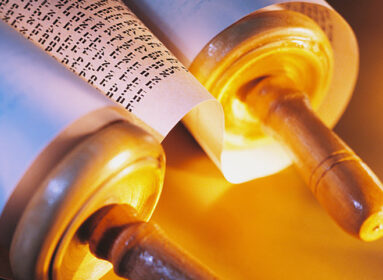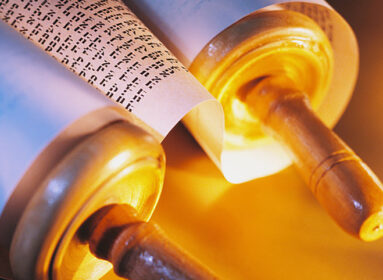By Rabbi Andrea Cohen Kiener –
“Noah was righteous in his generation.” Our sages discussed the implication of being righteous in such an evil generation. How would he have fared in Abraham’s time? Can you be “relatively” righteous?
Noah was righteous in his generation. His justice work, his re-balancing act, was specific to the needs of his time. Noah’s ark was a seed bank, stocked with the genetic material that would repopulate the earth. According to our mythic history, Noah succeeded in planting that seed back into a mountain in Asia. From here, the human and animal kingdoms walked off to fill the three continents of Asia, Europe and Africa.
We are heralding a similar time of weather disruption with ominous threats for global populations, here and there all around the world. The real weather is astonishingly like forecasts from the books of Numbers and Deuteronomy which speak about pestilence and hail, acid rain and infertility. The pshat, the plain verbal meaning of our text, is coming true.
Our ancestors were farmers and shepherds. Everything they understood about life was illuminated within that context. Moses and David prepared to be leaders by tending their flocks. Abraham learned to trust and hear God by exploring the night sky. Our biblical roots show us a land-based regional economy that was interdependent and community-building. The biblical version of wealth involves fig trees, wine, oil and corn – in their seasons. These are indeed the blessings of the land and our birthright. When I feel how far I am from this pastoral context – I see clearly that I do not understand the worldview of my own people or the pshat of my own text.
Collectively, we have mastered the technologies that push back the hold nature has on us. We push back the barriers of dark and cold with electricity and heating fuels. We defy the limitations of water in farming regions via transcontinental irrigation lines. We are richer materially and poorer emotionally for these technologies. The Holy One promises us that His eye is constantly on the Promised Land, bringing weather conditions in response to the generosity and balance of our way of life. In the Promised Land we will not succumb to the illusion of control of the Egyptian mindset – with their cyclical floods and easy irrigation. In our time, we do not know how a farmer waits for rain in the right season, and we are poorer for it. That act of praying for and relying on the rain is in the Shema prayer that we say twice daily.
The evil ones of Noah’s generation were breaking the bounds of nature and so they were washed away. They were “ruining the earth.” (Gen. 6:11) The teaching of Noah is that we are not the masters. And normal laws of biology and physics rule. There is a feedback system in nature that shows us when we are cut off and out of balance.
What is the righteousness for our generation? Can we temper the inclination to technical mastery? Should we try?
The wealth of our generation is a false wealth. It does not protect us from terrors in the night and the flood of world circumstances. Our wealth in fact leaves us vulnerable to the breakdown of global systems over which none of us has material control. In this age of sinking economies and massive shifts in global weather portents, it is time to think about what really makes us safe, healthy and wealthy. Many in our community are doing just such a re-evaluation as I write these words. Has your household economy shrunk in the past three years?
Against this backdrop, it is useful to discern when we are wasting and when we are over-consuming. Those of us with privilege are called by the metaphysics of Torah to tithe, to reinvest 10% towards the systemic amelioration of poverty. All of us can quell the influence of our jealous eye. If we know what we really need, we care less to keep up with the Joneses and the Cohens. To curb the desire for what is not ours is one of the Ten Commandments.
To be happy with our lot is the Rabbi Zoma’s definition of wealth (Pirkei Avot 4:1). The Mishna further exhorts us to practice modesty of consumption (Avot 5:19). Indeed, this modesty is a hallmark of the disciples of Abraham. In prayer, we ask the Holy One to grant us a hunger for true and useful things. This is how we sanctify the world with our deeds. Like the sons of Noah, when we face catastrophe we must question our assumptions. How grateful was Noah for a life-affirming mission, a place to live, food to eat and the comfort of family in his era of decay. What else do we really need?
Rabbi Andrea Cohen Kiener serves Congregation P’nai Or of Central CT and Beth Israel, Winsted.








 Southern New England Jewish Ledger
Southern New England Jewish Ledger










